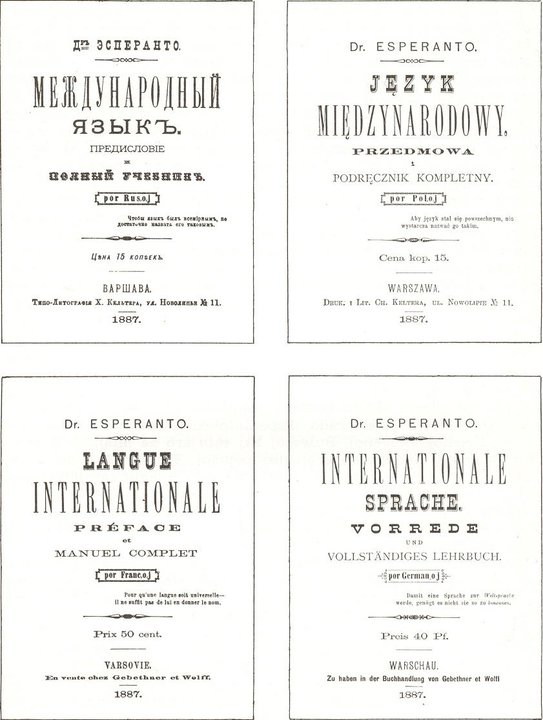Unua Pensoj
En 1887 Ludovic Lazarus Zamenhof skribis la unuan libron pri Esperanto. (Rusa Lingvo)
In 1887 Ludovic Lazarus Zamenhof wrote
the first book about Esperanto.
(in Russian).

Jen Esperante (per Zamenhof 1903):
Kiom da tempo, laboroj kaj materialaj
rimedoj estas perdata por tio, ke la
produktoj de unu literaturo estu aligitaj
al ĉiuj aliaj literaturoj, kaj en la fino
ĉiu el ni povas per tradukoj konatiĝi nur
kun la plej sensignifa parto de fremdaj
literaturoj;
sed ĉe ekzistado de lingvo internacia
ĉiuj tradukoj estus farataj nur en tiun
ĉi lastan, kiel neŭtralan, al ĉiuj kompreneblan,
kaj la verkoj, kiuj havas karakteron internacian,
estus eble skribataj rekte en ĝi. 1
R.H. Geoghegan tradukis la rusan por anglaj legantoj. 2
R.H. Geoghegan translated the Russian
for English readers.
"How much time, labour, and money are
wasted in translating the literary
productions of one nation into the
language of another, and yet, if we rely
on translations alone, we can become
acquainted with but a tithe of foreign literature.
Were there but an international language,
all translations would be made into it alone,
as into a tongue intelligible to all, and works
of an international character would be written
in it in the first instance."
Inter la unuaj argumentoj por havi Esperanton estis ebligi legantojn tra la mondo lerni literaturon de multaj aliaj kulturoj, precipe la literaturo, kiu ne eblus tradukita facile aŭ rapide en sian propran lingvon.
One of the first arguments for having Esperanto
was to enable readers around the world to learn
about literature from many other cultures,
especially literature that may not be translated
easily or quickly into their own language.
Zamenhof daŭrigis:
Falus la ĥinaj muroj inter la homaj literaturoj;
la literaturaj produktoj de aliaj popoloj fariĝus
por ni tiel same atingeblaj, kiel la verkoj de
nia propra popolo; la legataĵo fariĝus komuna
por ĉiuj homoj, kaj kune kun ĝi ankaŭ la edukado,
idealoj, konvinkoj, celado, – kaj la popoloj
interproksimiĝus kiel unu familio.
Zamenof continued:
"The Chinese wall dividing literatures would
disappear, and the works of other nations
would be as readily intelligible to us as
those of our own authors. Books being the
same for everyone, education, ideals, convictions,
aims, would be the same too, and all nations
would be united in a common brotherhood."
Plie, vi povas aŭdi la voĉon de Zamenhof ĉi tie kun aliaj dosieroj: 3
And, you can hear Zamenhof's voice among these other files.
referencoj/references
-
Zamenhof, “El la unua libro de la lingvo Esperanto” in Fundamenta Krestomatio, 1903. https://eo.m.wikisource.org/wiki/Fundamenta_Krestomatio/El_la_unua_libro_de_la_lingvo_Esperanto ↩
-
“Dr. Esperanto’s International Language”, translated by R.H. Geoghegan, 1889. http://www.genekeyes.com/Dr_Esperanto.html#Main ↩
-
Category:La Unua Libro Wikipedia Media ↩